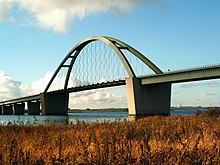Fehmarn Sound Bridge
| Fehmarn Sound Bridge | |
|---|---|

Fehmarn Sound bridge seen from Wulfener Hals
|
|
| Coordinates | 54°24′05″N 11°06′45″E / 54.40139°N 11.11250°ECoordinates: 54°24′05″N 11°06′45″E / 54.40139°N 11.11250°E |
| Crosses | Fehmarn Sound |
| Official name | Fehmarnsundbrücke (German) |
| Characteristics | |
| Total length | 963.4 m (3,160 ft 9 in) |
| Width | 21 m (68 ft 11 in) |
| Height | 67 m (219 ft 10 in) |
| Longest span | 248 m (813 ft 8 in) |
| Clearance above | 23 m (75 ft) |
| History | |
| Opened | 1963-04-30 |
The Fehmarn Sound Bridge (German: Fehmarnsundbrücke) connects the German island of Fehmarn in the Baltic Sea with the German mainland near Großenbrode.
The 963-metre-long (3,159 ft) crossing includes the 248-metre-long (814 ft) network arch bridge which carries road and rail over the 1,300-metre-wide (4,265 ft) Fehmarn Sound. Construction began in 1958 and the bridge was opened on April 30, 1963. The main span is 23 metres (75 ft) above the sea, which allows shipping to pass through. The bridge is constructed of steel and is 21 metres (70 ft) wide; 6 metres (20 ft) are used by Deutsche Bahn for a single rail track, part of the Lübeck–Puttgarden railway, the rest for a pedestrian walkway and two-lane roadway. The two steel arches, from which the central span is suspended by cables, are braced with steel cross-beams. The arches are 248 metres (810 ft) in length and reach 45 metres (150 ft) above the main deck of the bridge. The bridge was designed by engineers G. Fischer, T. Jahnke und P. Stein from the firm Gutehoffnungshütte Sterkrade AG, Oberhausen-Sterkrade. Architect Gerd Lohmer helped with the architectural design.
At the same time as the opening of the bridge, changes were made to ferry services. The previous ferry service to the island of Fehmarn was discontinued. The service from Großenbrode Quay, Germany to Gedser, Denmark, crossing both Fehmarn Sound and the Fehmarn Belt, was replaced with a new service from Puttgarden (on Fehmarn) to Rødby, Denmark crossing just the Fehmarn Belt. The new bridge and ferry changes brought about a substantial time saving for both road and rail traffic along the so-called Vogelfluglinie (literally "bird flight line") from Hamburg to Copenhagen.
...
Wikipedia
